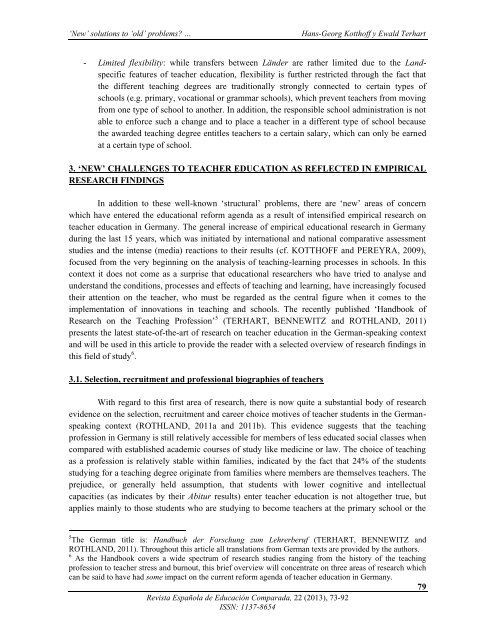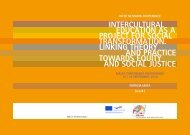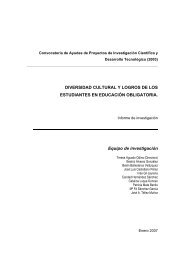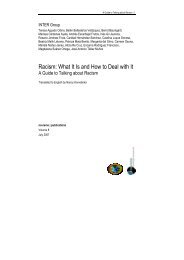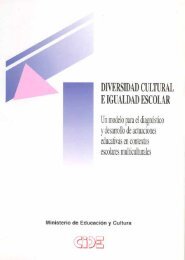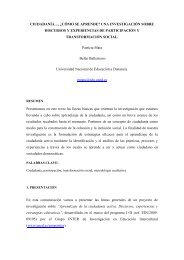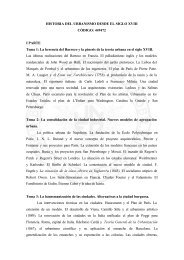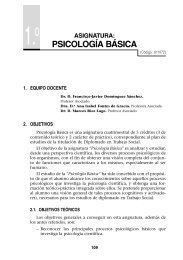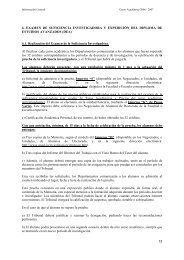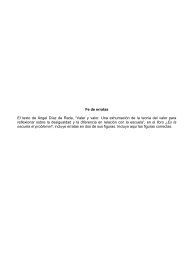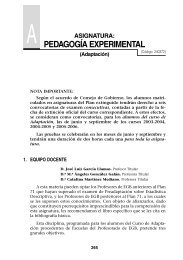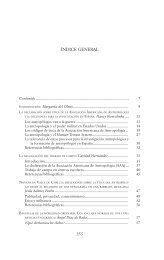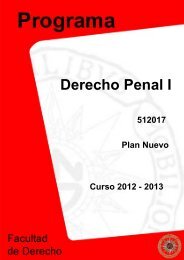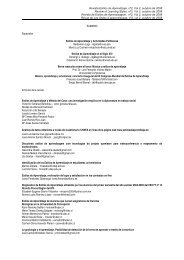'NEW' SOLUTIONS TO 'OLD' PROBLEMS? RECENT ... - UNED
'NEW' SOLUTIONS TO 'OLD' PROBLEMS? RECENT ... - UNED
'NEW' SOLUTIONS TO 'OLD' PROBLEMS? RECENT ... - UNED
You also want an ePaper? Increase the reach of your titles
YUMPU automatically turns print PDFs into web optimized ePapers that Google loves.
‘New’ solutions to ‘old’ problems? …<br />
Hans-Georg Kotthoff y Ewald Terhart<br />
- Limited flexibility: while transfers between Länder are rather limited due to the Landspecific<br />
features of teacher education, flexibility is further restricted through the fact that<br />
the different teaching degrees are traditionally strongly connected to certain types of<br />
schools (e.g. primary, vocational or grammar schools), which prevent teachers from moving<br />
from one type of school to another. In addition, the responsible school administration is not<br />
able to enforce such a change and to place a teacher in a different type of school because<br />
the awarded teaching degree entitles teachers to a certain salary, which can only be earned<br />
at a certain type of school.<br />
3. ‘NEW’ CHALLENGES <strong>TO</strong> TEACHER EDUCATION AS REFLECTED IN EMPIRICAL<br />
RESEARCH FINDINGS<br />
In addition to these well-known ‘structural’ problems, there are ‘new’ areas of concern<br />
which have entered the educational reform agenda as a result of intensified empirical research on<br />
teacher education in Germany. The general increase of empirical educational research in Germany<br />
during the last 15 years, which was initiated by international and national comparative assessment<br />
studies and the intense (media) reactions to their results (cf. KOTTHOFF and PEREYRA, 2009),<br />
focused from the very beginning on the analysis of teaching-learning processes in schools. In this<br />
context it does not come as a surprise that educational researchers who have tried to analyse and<br />
understand the conditions, processes and effects of teaching and learning, have increasingly focused<br />
their attention on the teacher, who must be regarded as the central figure when it comes to the<br />
implementation of innovations in teaching and schools. The recently published ‘Handbook of<br />
Research on the Teaching Profession’ 5 (TERHART, BENNEWITZ and ROTHLAND, 2011)<br />
presents the latest state-of-the-art of research on teacher education in the German-speaking context<br />
and will be used in this article to provide the reader with a selected overview of research findings in<br />
this field of study 6 .<br />
3.1. Selection, recruitment and professional biographies of teachers<br />
With regard to this first area of research, there is now quite a substantial body of research<br />
evidence on the selection, recruitment and career choice motives of teacher students in the Germanspeaking<br />
context (ROTHLAND, 2011a and 2011b). This evidence suggests that the teaching<br />
profession in Germany is still relatively accessible for members of less educated social classes when<br />
compared with established academic courses of study like medicine or law. The choice of teaching<br />
as a profession is relatively stable within families, indicated by the fact that 24% of the students<br />
studying for a teaching degree originate from families where members are themselves teachers. The<br />
prejudice, or generally held assumption, that students with lower cognitive and intellectual<br />
capacities (as indicates by their Abitur results) enter teacher education is not altogether true, but<br />
applies mainly to those students who are studying to become teachers at the primary school or the<br />
5 The German title is: Handbuch der Forschung zum Lehrerberuf (TERHART, BENNEWITZ and<br />
ROTHLAND, 2011). Throughout this article all translations from German texts are provided by the authors.<br />
6 As the Handbook covers a wide spectrum of research studies ranging from the history of the teaching<br />
profession to teacher stress and burnout, this brief overview will concentrate on three areas of research which<br />
can be said to have had some impact on the current reform agenda of teacher education in Germany.<br />
79<br />
Revista Española de Educación Comparada, 22 (2013), 73-92<br />
ISSN: 1137-8654


